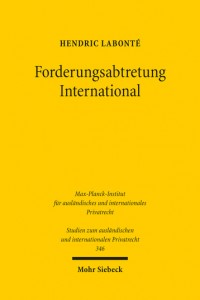The following announcement has been kindly provided by Dr. Susanne Lilian Gössl, LL.M., University of Bonn:
Call for Papers
On 6th and 7th April 2017, for the first time a young scholars’ conference in the field of Private International Law (PIL) will be held at the University of Bonn.
The general topic will be
Politics and Private International Law (?)
We hereby invite interested junior researchers to send us their proposals for conference papers. We envisage presentations of half an hour each in German language with subsequent discussion on the respective subject. The presented papers will be published in a conference transcript by Mohr Siebeck.
Procedure
If we have stimulated your interest we are looking forward to your application to
nachwuchs-ipr(at)institut-familienrecht.de
until 30 June 2016, 12 a.m. CET (deadline!).
The application shall include an exposé of maximum 1,000 words in German language and shall be composed anonymously that is without any reference to the authorship. The author including his/her position or other affiliation shall be identifiable from a separate file.
Selection decisions will be communicated in October 2016.
For organisational reasons, a preliminary version of the paper (to measure 35,000 to 50,000 characters including footnotes) and the core statements must be received by not later than 31 March 2017.
Topic:
For our purposes, we explicitly understand PIL in a broader sense: international jurisdiction and procedure, the law of the international settlement of disputes (including ADR) as well as uniform law and comparative law and the comparison of legal cultures are included insofar as they allude to cross-border questions.
Ever since Savigny, conflict of laws rules have traditionally been perceived as “unbiased” or “value-neutral” in Central Europe as they are solely supposed to coordinate the applicable substantive law. However, during the second half of the past century the opinion that conflict of law rules may also strengthen or prevent certain results of substantive law has become prevalent. In the U.S., such discussion led to a partial abolition of the “classical” PIL in favour of balancing the individual governmental interests as to the application of their respective substantive law provisions (so called governmental interest analysis). But other legal systems have also explicitly or indirectly restricted classical PIL in some areas in favour of governmental interests. Our conference is dedicated to the various possibilities and aspects of this interaction between PIL and politics as well as to the advantages and disadvantages of this interplay.
Possible topics or topic areas are:
General questions:
- “Politicisation” of PIL on the national, European and international level, or the political target of “value-free” PIL rules (?)
- “Politicisation” of comparative law (?)
- Convergence of PIL and Public International Law, especially the protection of fundamental rights and human rights by means of PIL
- Uniform applicable law or harmonisation of PIL
- PIL in day-to-day application of law – theory and reality (?)
- General instruments of PIL to enforce political targets: overriding mandatory rules, public policy, forum non conveniens, extensive/narrow jurisdiction …
- Allocative functions of PIL and International Civil Procedure Law
- Users, stakeholders and their interests in cross-border questions: parties, attorneys, judges, notaries, experts etc.
- Protection by formal requirements or third parties’ obligations to cooperate (e.g. notarial recording of the choice of law agreement)
- Parties’ or courts’ expenses due to the application of foreign law
- Regulatory competition, e.g. in order to establish a national venue of arbitration
- Forum shopping and locational advantages through low standards of protection (e.g. regarding data protection law, copyright law, family law or consumer protection law)
- Issues of competences as regards European PIL rules
- Extraterritorial application of national (private) law (Kiobel, Bodo Community)
Business Law:
- Financial crisis, e.g. resolution of globally operating banks
- Gender Quotas of in Corporate Law, e.g. application of German law on foreign companies or comparison between international regulatory models
- Protection of competition in case of worldwide groups operating, e.g. Google antitrust proceedings by FTC and EU Commission
- Law on co-determination within the European context, e.g. questions referred for a preliminary ruling by KG (Court of Appeal in Berlin) and LG Frankfurt
- Worker protection
Family and Inheritance Law:
- Protection of minors, i.e. regarding repatriation of children or international adoptions: successful legal unification (?)
- Cross-border protection of adults
- Application of religious law and judgements of religious courts
Consumer protection:
- Consumer protection and market freedom (i.a. in the Internet)
- Special jurisdiction, party autonomy and the enforcement of minimum standards in substantive law
Internet and new media:
- Territoriality of rights to ubiquitous goods (e.g. copyright law and data protection rules) and cross-border trade
- Copyright Law and “Fair Use”
- Data protection/privacy and freedom of information
Other recent focal points:
- Migration and refugee crisis, e.g. the determination of the law of the person between integration or preservation of cultural identity
- Environmental protection, e.g. enforcement of titles from class actions or international litigation regarding mass damages
- Protection of cultural property – issues regarding ownership and repatriation
For more information, please visit https://www.jura.uni-bonn.de/en/institut-fuer-deutsches-europaeisches-und-internationales-familienrecht/pil-conference/.
If you have any further questions, please contact Dr. Susanne Gössl, LL.M. (sgoessl(at)uni-bonn.de).
We are looking forward to thought-provoking and stimulating discussions!
Yours faithfully,
Susanne Gössl
Rafael Harnos
Leonhard Hübner
Malte Kramme
Tobias Lutzi
Michael Müller
Caroline Rupp
Johannes Ungerer
